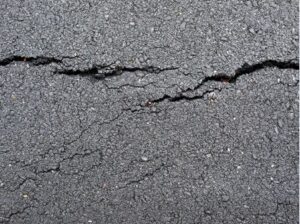 Drive down most roads and you’re likely to see (and feel) all sorts of cracks. It’s a shame, because those cracks wreck havoc on vehicles and make for really bumpy rides.
Drive down most roads and you’re likely to see (and feel) all sorts of cracks. It’s a shame, because those cracks wreck havoc on vehicles and make for really bumpy rides.
Most roads and driveways in the U.S. are made of asphalt and concrete. Both materials are prone to cracking for several reasons.
Just like a home needs a strong foundation to weather storms over time, roads need a well-constructed base and/or subbase. Typically, the base of a road is formed using crushed stone packed tightly along with an aggregate base and then asphalt/concrete on top to finish it off. If you wonder why you see so many cracks in roads and driveways, then, it’s probably because the foundation wasn’t as strong as it should have been– sand or dirt were used instead of stronger materials.
If less-than-stellar base materials are used to construct something that has to deal with ice, rain, snow and more, what do you think will happen? The materials can’t handle the freeze-thaw cycle so well– they’ll expand and contract and then you’ll get… cracks.
For a long time, conventional wisdom was to put salt on roads and driveways to melt ice in the colder months. However, here’s what salt does: it speeds up the thawing process, helping water seep into a paved surface where it then refreezes underneath the ground. Guess what easily happens then? If you guessed, cracks, you’re right. It’s better to use sand than salt in order to get traction on icy roads and driveways, as sand won’t cause cracks.
What else causes paved surfaces to crack? Two things: tree roots and excessive weight. As much as we’d like our paved surfaces to be perfect, there are always other factors involved in whether or not cracks develop over time.
Classic Turf Company has found a way to utilize something known as “post-tension concrete technology” to create outdoor sports surfaces that come with a 20-year crack-free guarantee. As you’d imagine, Classic Turf’s tennis courts and basketball courts are in high-demand because municipalities, schools and other organizations don’t want to spend a lot of money for courts that easily crack up and become a safety hazard.
Read more about post-tension concrete technology here: https://www.classicturf.org/post-tension-concrete.html and then call Classic Turf Company at 1-800-246-7951 with questions.
